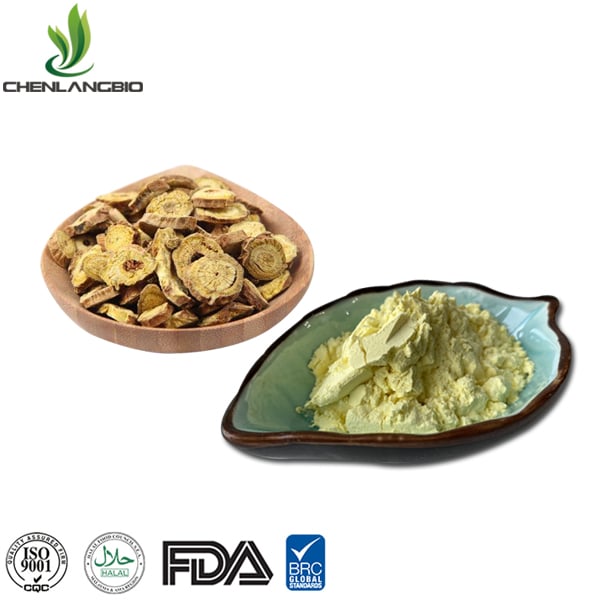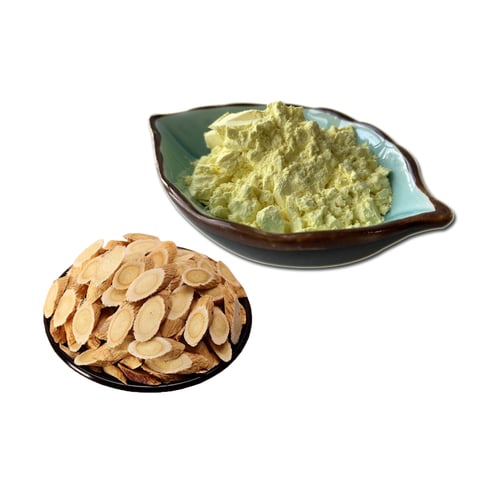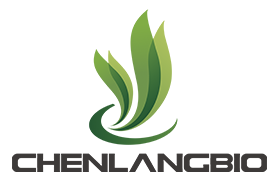
Wogonin
XI AN CHEN LANG BIO TECH CO., LTD has been producing plant extracts, functional cosmetic raw materials, and nutritional supplements for more than 15 years. High-quality products, safe and stable supply have enabled us to become a global raw material supplier.
What is Wogonin
Wogonin is a flavonoid compound found in the root of Scutellaria baicalensis, a traditional Chinese medicinal herb commonly known as Chinese skullcap. It has been studied for its potential health benefits, including anti-inflammatory, antioxidant, and anticancer properties. Wogonin has attracted attention in scientific research for its therapeutic potential in various diseases.

| Name | Wogonin |
| Purity | 98%+ |
| CAS | 632-85-9 |
| Molecular Formula |
C16H12O5 |
| Molecular Weight |
284.2635 |
| Appearance |
Yellow crystal powder |
| MOQ | 10 Gram |
| Package |
1Kg/Aluminum Foil Bag |
Wogonin Solubility
Wogonin is very soluble in methanol, ethanol, acetone and ethyl acetate, soluble in ethanol, acetic acid and chloroform, slightly soluble in benzene and water, insoluble in carbon disulfide and petroleum.
Pharmacological Effects
Wogonin is a flavonoid compound extracted from the roots of Scutellaria baicalensis, a plant of the Lamiaceae family. It has a variety of pharmacological activities, including antioxidant activity, anti-inflammatory, and immunomodulatory effects. In addition, it also has neuroprotective effects during cerebral ischemia.
Wogonin Benefits
Wogonin is a flavonoid compound found in the root of Scutellaria baicalensis, a traditional Chinese herb commonly known as Chinese skullcap. It has been studied for its potential health benefits, particularly its anti-inflammatory, antioxidant, and anticancer properties. Here's how wogonin functions in the human body:
Anti-inflammatory: It has been shown to inhibit the production of inflammatory molecules such as cytokines and prostaglandins. By reducing inflammation, it may help alleviate symptoms of inflammatory conditions such as arthritis and inflammatory bowel disease.
Antioxidant: It exhibits antioxidant properties, meaning it can neutralize harmful free radicals in the body. This antioxidant activity may help protect cells from oxidative damage, which is implicated in various diseases including cancer, cardiovascular diseases, and neurodegenerative disorders.
Anticancer: There is growing interest in wogonin's potential as a cancer-fighting compound. Studies have suggested that wogonin may inhibit the growth and spread of cancer cells by inducing apoptosis (programmed cell death), blocking cell cycle progression, and suppressing tumor angiogenesis (the formation of new blood vessels to supply tumors with nutrients).
Neuroprotective: Some research indicates that wogonin powder may have neuroprotective effects, meaning it could help protect nerve cells from damage and degeneration. This property could be beneficial in the treatment of neurodegenerative diseases such as Alzheimer's and Parkinson's disease.
Antimicrobial: Wogonin has demonstrated antimicrobial activity against various bacteria and fungi, suggesting its potential in the treatment of infections.
Baicalein VS Wogonin
Baicalein and wogonin are both flavonoid compounds found in the root of Scutellaria baicalensis (Chinese skullcap), but they have some differences:
Chemical Structure: Baicalein (5,6,7-trihydroxyflavone) and wogonin (5,7-dihydroxy-8-methoxyflavone) differ in their chemical structures. Baicalein has three hydroxyl (OH) groups attached at positions 5, 6, and 7 of the flavone structure, while wogonin has two hydroxyl groups at positions 5 and 7, along with a methoxy (OCH3) group at position 8.
Biological Activities: Although both baicalein and wogonin exhibit various biological activities, such as anti-inflammatory, antioxidant, and anticancer properties, they may have different potencies and mechanisms of action due to their structural differences. For example, some studies suggest that wogonin may have stronger anticancer activity compared to baicalein in certain contexts.
Metabolism: In the body, both they all can undergo metabolism, leading to the formation of various metabolites with potentially different biological activities. The presence of the methoxy group in wogonin may affect its metabolism and pharmacokinetics compared to baicalein.
Bioavailability: The bioavailability of baicalein and wogonin, which refers to the extent and rate at which they are absorbed and reach systemic circulation, may differ. Factors such as solubility, metabolism, and tissue distribution can influence their bioavailability and ultimately their efficacy in vivo.
While baicalein and wogonin share some similarities in their biological activities and therapeutic potentials, their distinct chemical structures contribute to differences in their pharmacological properties and potential applications.
Where to Buy Wogonin
XI AN CHEN LANG BIO TECH CO., LTD is CAS: 632-85-9 wogonin supplier and manufacturer. We supply high quality wogonin 98%+, please send inquiry to Email: [email protected] to get COA and other information.



